Most students learn the fourth amendment to the U.S. Constitution protects citizens from police searches and seizures. But how are police trained in the difference between reasonable suspicion and probable cause?
Police training in the state of Illinois -- whether it's full-time, part-time, military or quasi-military style -- requires 480 hours altogether. Forty of those are called scenario training.
All 480 hours are broken into six categories: human behavior, law, police function, patrol procedures, investigations and traffic. The law block is the largest, requiring at least 73 training hours. Sixteen of those are solely devoted to search and seizure.
Cora Beem, manager of mandated training for the Illinois Law Enforcement Training and Standards Board, says that covers civil rights and liabilities, along with the rights of the accused and use of force.
Beem says it comes down to teaching her students the difference between reasonable suspicion -- or a hunch, as she calls it -- and probable cause.
"My recruits would always be, 'What if, what if, what if?'" Beem said. "And in law enforcement, and the courts have said that the police officer always looks at what's called the 'totality of the circumstances.'"
Let's say you are standing in front of a school in the middle of the afternoon and keep looking at your watch. You could look suspicious to a police officer, so the officer might approach you and ask if you are waiting for somebody or need to know what time school lets out.
From there, the officer has to determine whether there's something fishy going on.
Beem says if you and the officer engage in a pleasant conversation and the officer determines there's nothing to be concerned about, then the officer would leave.
"So I go up, I make my encounter with you, you're perfectly fine -- 'Great, have a nice day,'" Beem said. "But now what if you said to me, 'I don't have to talk to you, pig - go away'? Guess what -- you don't have to talk to me."
Beem says that, despite whatever hunch the officer may have, he or she would not have any reason to pursue any further action.
The same logic applies to a traffic stop. Beem says that, if an automatic license plate scan shows that the owner of the car has a suspended or revoked license, then the officer can determine if the driver is the owner by pulling the driver over. That would be considered reasonable suspicion.
The way the officer would get probable cause is by the officer asking for a driver's license, which the driver must give in Illinois. If the license scan says the driver is valid to drive and is not the registered driver of the vehicle, the officer will hand back the license.
"But if I run your license, driver's license, and it says you're suspended or revoked, that's my probable cause to arrest you," Beem said.


